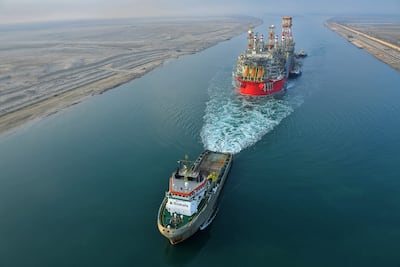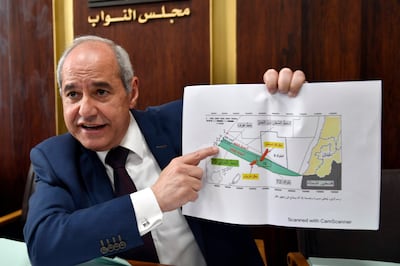A long-running dispute between Israel and Lebanon over maritime boundaries in the Eastern Mediterranean has reared its head again.
It comes as an Israeli official poured cold water on prospects of a renewed conflict between the two nations.
But what is the history of the disagreement and what has sparked its re-emergence?
Why are Lebanon and Israel in dispute?
The argument is over the Karish offshore gasfield, which was discovered a decade ago. Both Lebanon and Israel claim it as part of their respective exclusive economic zones.
US-mediated talks about the countries' maritime boundaries began in 2020, but have made little progress.
Lebanon and Israel last fought a war in 2006 and are separated by a UN-patrolled border. The indirect negotiations, which are currently stalled, have been complicated by the fact that the two countries do not have diplomatic relations.
What sparked the latest controversy?
The arrival of a vessel operated by international energy company Energean to produce gas for Israel at the site, which is about 80 kilometres west of Haifa. It is expected to begin operations immediately, with gas likely to begin coming in from September.
On Sunday, Lebanese President Michel Aoun said negotiations were continuing, adding that “any activity in the disputed area” would be a “hostile act”.
Lebanon said some of the Karish field is within the maritime boundaries it has claimed at the US-mediated negotiations. Beirut expanded its territorial claim by about 1,400 square kilometres to "Line 29".
What is Line 23?
In 2011, in its official decree to the UN delineating its boundaries, Lebanon’s claim did not include the Karish field. That boundary has been known as "Line 23." Beirut has yet to formally amend that claim, known as Decree 6433.
Hassan Diab, Lebanon's caretaker prime minister at the time, approved an amended decree in April last year, but Mr Aoun has yet to sign off on it.
Israel's claim runs farther north than the gasfield.
Hezbollah, the Iran-backed Lebanese militant group, has threatened to take action against Israel if it carries out operations in the maritime area before the dispute is solved.
“When the Lebanese state says that the Israelis are assaulting our waters and our oil, then we are ready to do our part in terms of pressure, deterrence and use of appropriate means — including force,” Naim Qassem, Hezbollah’s deputy leader, told Reuters on Monday.
“The issue requires a decisive decision from the Lebanese state,” he said. He said Hezbollah “urged the government to hurry up, to set a deadline for itself”.
Imad Salamey, a political analyst at the Lebanese American University, said a continued failure to resolve the dispute would be “to the advantage of Hezbollah” because it could claim to be the only protector of Lebanon’s sovereignty.
Mr Aoun has agreed to invite US energy official Amos Hochstein, who led the demarcation talks, to Lebanon to continue negotiations.
Mr Aoun’s office said Lebanon informed the UN in February that Karish is part of the disputed area and that the UN Security Council should prevent Israel from drilling there “to avoid steps that could form a threat to international peace and security”.
Where does Israel stand?
Israeli Energy Minister Karin Elharrar insisted on Monday that there had been no encroachment.
She has played down fears of a conflict, referring to a “disconnect” between rhetoric and reality.
But she said: “Israel is making preparations (and) I recommend that no one try to surprise Israel.”
Lebanon’s caretaker Prime Minister Najib Mikati said Israel was “encroaching on Lebanon's maritime wealth, and imposing a fait accompli in a disputed area”.
Lebanon is experiencing a devastating economic collapse, with much of the population falling into poverty. Electricity from the state is available for only a few hours a day, with people forced to rely on expensive generators as a back-up.
Ms Elharrar has expressed hope Beirut will return to the negotiating table.
“Ultimately, there are gains to be made from negotiating, and they can get a gasfield of their own,” she said.
MATCH INFO
Jersey 147 (20 overs)
UAE 112 (19.2 overs)
Jersey win by 35 runs
Company profile
Date started: December 24, 2018
Founders: Omer Gurel, chief executive and co-founder and Edebali Sener, co-founder and chief technology officer
Based: Dubai Media City
Number of employees: 42 (34 in Dubai and a tech team of eight in Ankara, Turkey)
Sector: ConsumerTech and FinTech
Cashflow: Almost $1 million a year
Funding: Series A funding of $2.5m with Series B plans for May 2020
Asia Cup 2018 final
Who: India v Bangladesh
When: Friday, 3.30pm, Dubai International Stadium
Watch: Live on OSN Cricket HD
%3Cp%3E%3Cstrong%3ETHE%20SPECS%3C%2Fstrong%3E%0D%3Cbr%3EEngine%3A%203.5-litre%20V6%0D%3Cbr%3ETransmission%3A%209-speed%20automatc%0D%3Cbr%3EPower%3A%20279hp%0D%3Cbr%3ETorque%3A%20350Nm%0D%3Cbr%3EPrice%3A%20From%20Dh250%2C000%0D%3Cbr%3EOn%20sale%3A%20Now%3C%2Fp%3E%0A
SPEC%20SHEET%3A%20NOTHING%20PHONE%20(2A)
%3Cp%3E%3Cstrong%3EDisplay%3A%3C%2Fstrong%3E%206.7-inch%20flexible%20Amoled%2C%202%2C412%20x%201%2C080%2C%20394ppi%2C%20120Hz%2C%20Corning%20Gorilla%20Glass%205%3C%2Fp%3E%0A%3Cp%3E%3Cstrong%3EProcessor%3A%3C%2Fstrong%3E%20MediaTek%20Dimensity%207%2C200%20Pro%2C%204nm%2C%20octa-core%3C%2Fp%3E%0A%3Cp%3E%3Cstrong%3EMemory%3A%3C%2Fstrong%3E%208%2F12GB%3C%2Fp%3E%0A%3Cp%3E%3Cstrong%3ECapacity%3A%3C%2Fstrong%3E%20128%2F256GB%3C%2Fp%3E%0A%3Cp%3E%3Cstrong%3EPlatform%3A%3C%2Fstrong%3E%20Android%2014%2C%20Nothing%20OS%202.5%3C%2Fp%3E%0A%3Cp%3E%3Cstrong%3EMain%20camera%3A%3C%2Fstrong%3E%20Dual%2050MP%20main%2C%20f%2F1.88%20%2B%2050MP%20ultra-wide%2C%20f%2F2.2%3B%20OIS%2C%20EIS%2C%20auto-focus%2C%20ultra%20XDR%2C%20night%20mode%3C%2Fp%3E%0A%3Cp%3E%3Cstrong%3EMain%20camera%20video%3A%3C%2Fstrong%3E%204K%20%40%2030fps%2C%20full-HD%20%40%2060fps%3B%20slo-mo%20full-HD%20at%20120fps%3C%2Fp%3E%0A%3Cp%3E%3Cstrong%3EFront%20camera%3A%3C%2Fstrong%3E%2032MP%20wide%2C%20f%2F2.2%3C%2Fp%3E%0A%3Cp%3E%3Cstrong%3EBattery%3A%3C%2Fstrong%3E%205%2C000mAh%3B%2050%25%20in%2030%20minutes%20with%2045-watt%20charger%3C%2Fp%3E%0A%3Cp%3E%3Cstrong%3EConnectivity%3A%3C%2Fstrong%3E%20Wi-Fi%2C%20Bluetooth%205.3%2C%20NFC%20(Google%20Pay)%3C%2Fp%3E%0A%3Cp%3E%3Cstrong%3EBiometrics%3A%3C%2Fstrong%3E%20Fingerprint%2C%20face%20unlock%3C%2Fp%3E%0A%3Cp%3E%3Cstrong%3EI%2FO%3A%3C%2Fstrong%3E%20USB-C%3C%2Fp%3E%0A%3Cp%3E%3Cstrong%3EDurability%3A%3C%2Fstrong%3E%20IP54%2C%20limited%20protection%20from%20water%2Fdust%3C%2Fp%3E%0A%3Cp%3E%3Cstrong%3ECards%3A%3C%2Fstrong%3E%20Dual-nano%20SIM%3C%2Fp%3E%0A%3Cp%3E%3Cstrong%3EColours%3A%3C%2Fstrong%3E%20Black%2C%20milk%2C%20white%3C%2Fp%3E%0A%3Cp%3E%3Cstrong%3EIn%20the%20box%3A%3C%2Fstrong%3E%20Nothing%20Phone%20(2a)%2C%20USB-C-to-USB-C%20cable%2C%20pre-applied%20screen%20protector%2C%20Sim%20tray%20ejector%20tool%3C%2Fp%3E%0A%3Cp%3E%3Cstrong%3EPrice%20(UAE)%3A%3C%2Fstrong%3E%20Dh1%2C199%20(8GB%2F128GB)%20%2F%20Dh1%2C399%20(12GB%2F256GB)%3C%2Fp%3E%0A
Scoreline
UAE 2-1 Saudi Arabia
UAE Mabkhout 21’, Khalil 59’
Saudi Al Abed (pen) 20’
Man of the match Ahmed Khalil (UAE)
The major Hashd factions linked to Iran:
Badr Organisation: Seen as the most militarily capable faction in the Hashd. Iraqi Shiite exiles opposed to Saddam Hussein set up the group in Tehran in the early 1980s as the Badr Corps under the supervision of the Iran Revolutionary Guards Corps (IRGC). The militia exalts Iran’s Supreme Leader Ali Khamenei but intermittently cooperated with the US military.
Saraya Al Salam (Peace Brigade): Comprised of former members of the officially defunct Mahdi Army, a militia that was commanded by Iraqi cleric Moqtada Al Sadr and fought US and Iraqi government and other forces between 2004 and 2008. As part of a political overhaul aimed as casting Mr Al Sadr as a more nationalist and less sectarian figure, the cleric formed Saraya Al Salam in 2014. The group’s relations with Iran has been volatile.
Kataeb Hezbollah: The group, which is fighting on behalf of the Bashar Al Assad government in Syria, traces its origins to attacks on US forces in Iraq in 2004 and adopts a tough stance against Washington, calling the United States “the enemy of humanity”.
Asaeb Ahl Al Haq: An offshoot of the Mahdi Army active in Syria. Asaeb Ahl Al Haq’s leader Qais al Khazali was a student of Mr Al Moqtada’s late father Mohammed Sadeq Al Sadr, a prominent Shiite cleric who was killed during Saddam Hussein’s rule.
Harakat Hezbollah Al Nujaba: Formed in 2013 to fight alongside Mr Al Assad’s loyalists in Syria before joining the Hashd. The group is seen as among the most ideological and sectarian-driven Hashd militias in Syria and is the major recruiter of foreign fighters to Syria.
Saraya Al Khorasani: The ICRG formed Saraya Al Khorasani in the mid-1990s and the group is seen as the most ideologically attached to Iran among Tehran’s satellites in Iraq.
(Source: The Wilson Centre, the International Centre for the Study of Radicalisation)
Muslim Council of Elders condemns terrorism on religious sites
The Muslim Council of Elders has strongly condemned the criminal attacks on religious sites in Britain.
It firmly rejected “acts of terrorism, which constitute a flagrant violation of the sanctity of houses of worship”.
“Attacking places of worship is a form of terrorism and extremism that threatens peace and stability within societies,” it said.
The council also warned against the rise of hate speech, racism, extremism and Islamophobia. It urged the international community to join efforts to promote tolerance and peaceful coexistence.




